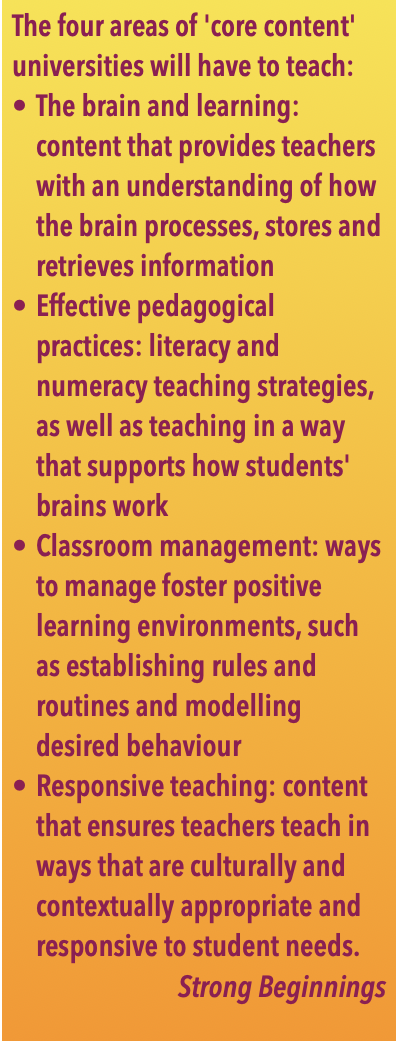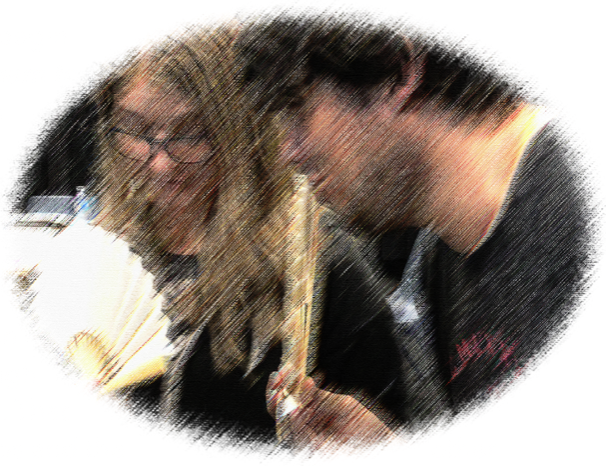Drama Tuesday - Teacher Education: Once more unto the breach…
/Everyone, it seems, has opinions about what’s wrong with teacher education. I have lost track of the number of reports. The latest, Strong Beginnings, is by the Teacher Education Expert Panel chaired by Professor Mark Scott (2023).
The Report provides a series of detailed recommendations and draws on research of current ITE (Initial Teacher Education) students.
What are the gaps identified?
Harris and Grace in the Sydney Morning Herald sum up: “many beginning teachers were under prepared to teach in several key areas, including reading, cultural responsiveness, classroom management and family/carer engagement.” (2023).
Bita (July 06, 2023) draws from the report:
“One in three final-year teaching undergraduates surveyed for the Scott Report complained that their degree had been “too theoretical and focused on teaching philosophies’’.
Some 60 per cent of trainee primary school teachers said they had not been given many opportunities to practise the explicit teaching of phonics in classrooms – essential for children to learn to read and write.
Only half said their degree had given them opportunities to evaluate students’ progress, adjust instruction and provide targeted feedback.
One graduate called for “less information on learning philosophers and more information on practical activities/lessons to teach curriculum areas”.
“More hands-on experience would have been more beneficial than constantly writing essays,’’ another trainee teacher said.
“I would have liked more instruction on behaviour management and how to build my skill set when dealing with children with defiant or destructive behaviours,” they added.
There are echoes of the populist litany of deficiencies and eduspeak catchphrases: phonics, explicit teaching, classroom management. The use of terms such as “old school” and “back to the basics” reflects a limiting way of thinking about teacher education. But graduates are painting a grim picture and the remedies are being spelt out..
Young teachers will learn the old-school skill of explicit instruction” by clearly explaining to children what they are expected to learn, chunked into small and manageable tasks.
Teachers will be taught to plan a sequence of lessons that include repetition and practice, so that children can retrieve their past learning and consolidate it into long-term memory.
Universities must ensure that teachers can provide worked examples for lessons, and wait until children are proficient before expecting them to solve problems on their own. “Practices should include the use of structured lessons, clear and explicit instruction, effective questioning that encourages participation, reducing cognitive load and use of specific and positive feedback that acknowledges student effort,’’ the new standards state.
To be able to keep classes under control, teachers must be taught to “effectively model desired behaviour, such as respectful interactions, being organised, and being on time, to prompt positive behaviour by setting and reinforcing expectations”. (BITA, July 06, 2023)
I can imagine cohorts of university people clenching their buttocks and sharpening their defences as they tap at their computers.
With a touch of defensiveness I take a moment to question the perceptions presented by students and reinforced by those warriors of the culture and education wars.
When I look at my teacher education practice, how did my courses include explicit instruction, lesson and sequence planning, worked examples, assessment and classroom management?
Explicit instruction. My drama teacher education workshops begin from a premise: we learn drama by making drama and we learn to teach drama by participating in drama teaching activities. In other words, we learn by participating, we learn from the modelling provided, we learn from explicit instruction in and modelling about teaching drama. When we were learning about, say, improvisation, students were given explicit models of offer/respond/progress/build and then we modelled using this routine. When we learnt about Laban Effort Actions as a language of movement, we worked through ways of activating student learning in the and through them. That learning was tied to realising role, character and relationships and the other Elements of Drama. And I can add more examples of explicit instruction.
Lesson and sequence planning. Students in my workshops were provided with models and examples of lesson plans and sequences linked to both the Australian Curriculum (ACARA, 2014) and Western Australian syllabuses (SCSAWA). They were tasked with writing plans, sharing them with others and critiquing their own planning. When on school practicum, they were required to plan lessons and sequences of lessons.
Worked examples. When we worked with Process Drama, students were provided with worked examples that they experienced. They wrote their own Process Drama plans.
Assessment. In the Western Australian Year 12 syllabus, school students complete practical and written exams. To prepare students to teach the practical exam, my students also completed the requirements of the practical exam including writing and performing original solo performances, improvisation, scripted monologue performance and interview. My students completed portfolios of drama strategies, reflection and analysis. They wrote case stories. In other words, their assessment was tied to their future teaching of drama in schools.
Classroom management. Across all the workshops, practically, hands on and experientially, I model approaches to drama classroom management. Lessons are planned and shared explicitly. we modelled warm-up up, cooling down, edging into drama. We used methods of checking in, building relationships, providing feedback. We worked through protocols of setting high expectations, supporting diversity, being organised and positive learning environments. Our learning was tied explicitly to the AITSL Standards (2011)
It’s not possible to argue from one example that all teacher education addresses the issues outlined in the Scott report. Nor can we assume that all students understood the learning design in my curriculum (at the time). But you can perhaps gather that I sometimes rankle at ill informed criticisms of all drama teacher education.
Don’t get me wrong.It’s not that I don’t have criticisms of what was possible in my drama teacher education courses.
The need for more content. I was often frustrated by the lack of knowledge about drama that students brought with them to teaching drama. A desire to teach drama needs to be underpinned by active and expanding knowledge and ongoing professional learning.
The need for more time. To address gaps in knowledge needs time. Teacher education is time poor (and the constraints of universities and budgets kept cutting that time detrimentally).
The need for practicum experience with experienced teachers who know the curriculum and share a commitment to future practice.
But having acknowledged that the structural issues of Australian universities get in the way of the best possible drama teacher education, I do want to push back on the tabloid and politicised criticisms of teacher education. Of course, it can always be better. But sometimes the carping criticisms can be answered (if only people would listen!).
Bibliography
ACARA. (2014). The Australian Curriculum: The Arts. Retrieved from http://www.australiancurriculum.edu.au/the-arts/introduction
AITSL. (2011). National system for the accreditation of pre‑service teacher education programs. Retrieved from http://www.aitsl.edu.au/verve/_resources/AITSL_Preservice_Consultation_Paper.pdf
BITA, N. (July 06, 2023). Old-school skills for new teachers as education ministers take control. The Australian.
Harris, C., & Grace, R. (2023, July 6, 2023 — 10.00pm). Universities who fail would-be teachers to be stripped of accreditation. Sydney Morning Herald.
Pascoe, R. (2022). Drama Teacher Education – A Long View Perspective. In M. McAvoy & P. O'Connor (Eds.), The Routledge companion to drama in education (pp. 471-483). Abingdon, Oxon: Routledge.
Teacher Education Expert Panel (Mark Scott). (2023). Strong Beginnings: Report of the Teacher Education Expert Panel. Retrieved from Canberra: https://www.education.gov.au/quality-initial-teacher-education-review/resources/strong-beginnings-report-teacher-education-expert-panel







